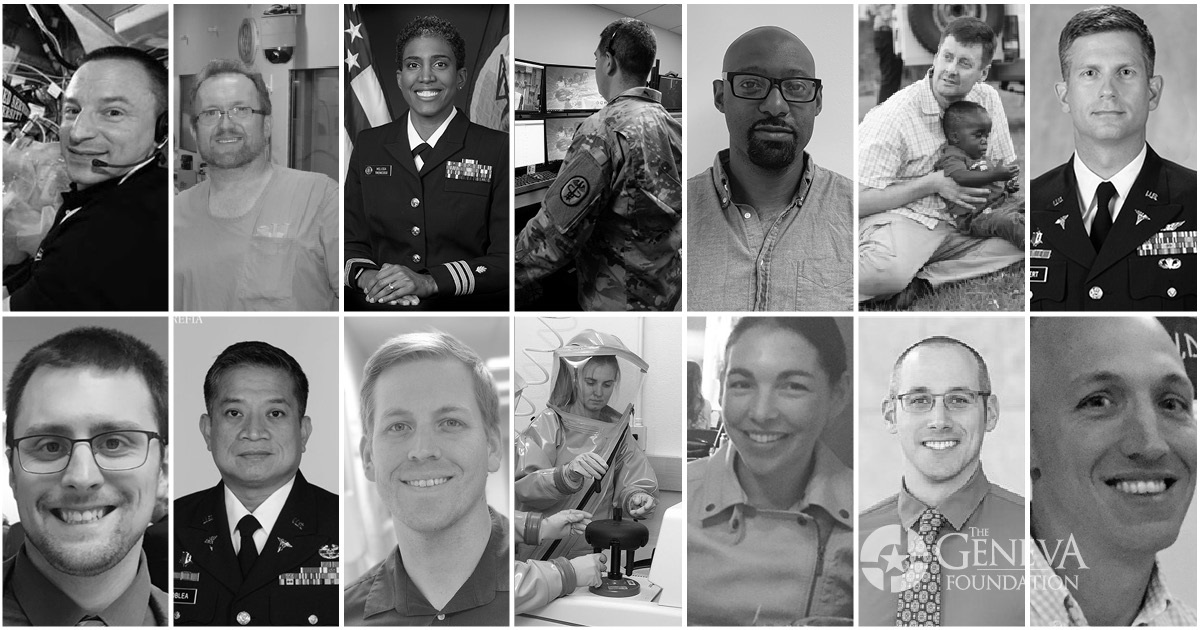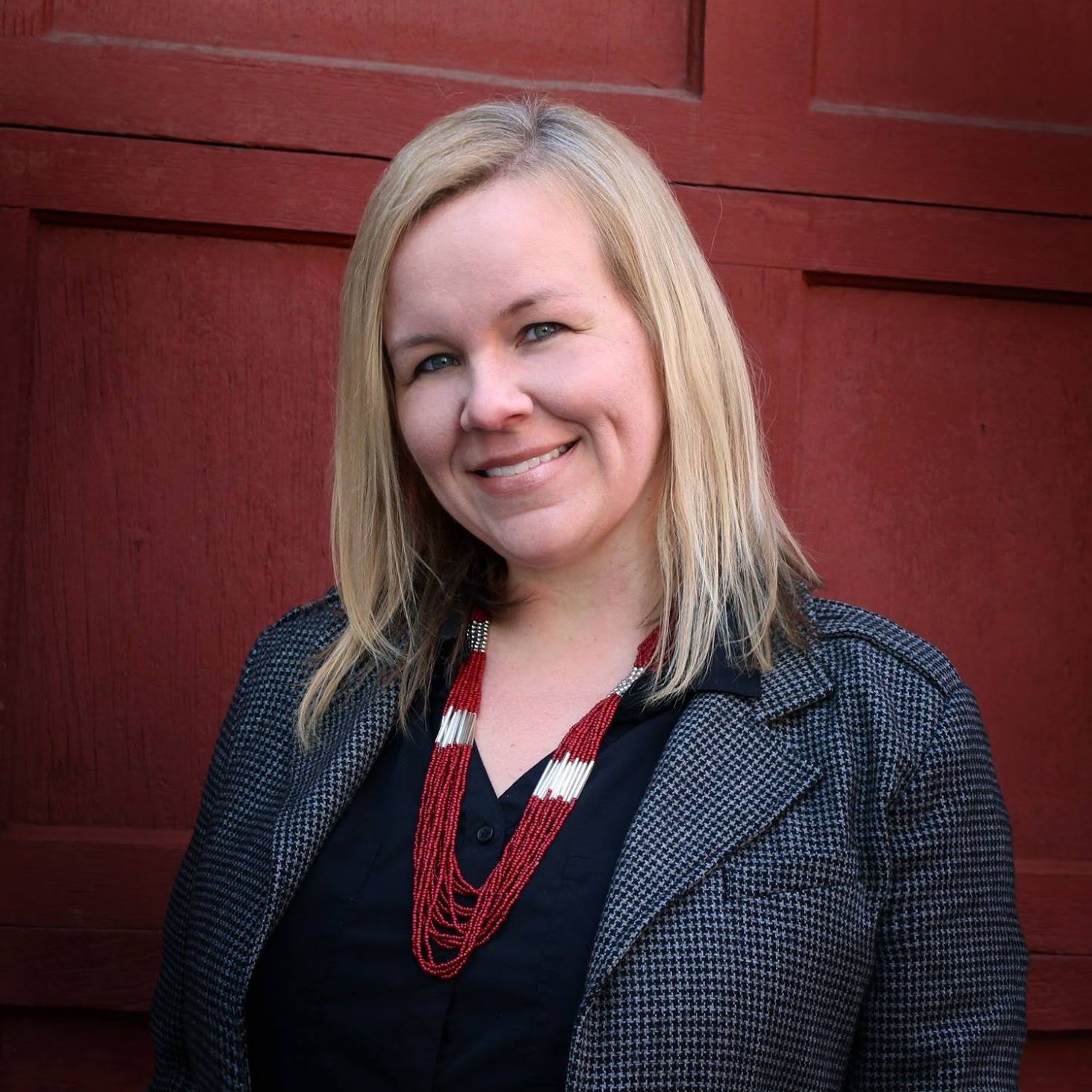14 January 2021
14 Geneva Military Medical Researchers Who Inspired Us in 2020
From advancements in biotechnology and trauma care, to nutrition, rehabilitative medicine, and infectious diseases, many of the world’s most pressing health issues have been affected by scientific and technological innovations in military medicine.
In the midst of the COVID-19 pandemic, Geneva would like to recognize the researchers who chase answers to the myriad of challenges that affect not only the military but the global community – and appreciate the pursuit of knowledge that inspires us.
Here’s a list of 14 military medical researchers who inspired us to bring you stories about their work this past year.
Frank A. Alexander, Jr., PhD
Dr. Frank Alexander, a research scientist with Geneva, is piloting a promising potential additive technique to address critical tissue shortages for corneas using electrospinning, bringing science one step closer to creating transplant tissue. The technology is part of a research initiative under the USU-4DBio3: 4-Defense Biotechnology, Biomanufacturing, and Bioprinting Center, a collaboration between Geneva, the Uniformed Services University (USU), U.S. Naval Research Laboratory, and Walter Reed National Military Medical Center (WRNMMC).
Andriy Batchinsky, MD
Renowned lung injury Geneva Research Scientist Dr. Andriy Batchinsky has been named Geneva’s 2019 Researcher of the Year in recognition of his long-standing career pursuing ground-breaking treatments for the management of acute respiratory distress syndrome (ARDS), with notable contributions in research quality and research mentorship. He is now directing several projects toward treatments for COVID-19, including the filing an invention disclosure for the Combat Resuscitation Organ Support System (CROSS), a wearable vest that provides modern lung support.
LTC Christopher J. Colombo, MD, FACP, FCCM
Principal Investigator LTC Christopher Colombo, MD, Chief of the Department of Virtual Health and Telecritical Care at Madigan Army Medical Center, is leading a team to create the Disaster Telemedicine Response System (DISTRESS), a distributed, comprehensive telecritical care system to make critical care resources more widely available. The National Emergency Telecritical Care Network (NETCCN) is a health information management system using cellular communication networks, mobile, and cloud technologies, to extend virtual critical care wards at nearly every bedside lacking adequate critical care expertise and resources necessary for the care of COVID-19-related illnesses.
John Dye, PhD
Dr. John Dye is the Chief of Viral Immunology at the U.S. Army Medical Research Institute of Infectious Diseases (USAMRIID) and was named Geneva’s 2016 Researcher of the Year. Dr. Dye has been at the forefront of the DoD’s research and development of filovirus vaccines and therapeutics. In March 2020, Dr. Dye and the team at USAMRIID discovered an antibody cocktail for protection against the lethal Sudan virus. Dr. Dye also made many national headlines this year for his infectious diseases expertise and his COVID-19 antibody work, where his team is testing alternative ways to measure COVID-19 antibody levels resulting in a faster, easier, and less expensive alternative for large-scale use.
LTC (P) Matthew Eckert, MD, FACS
The BG George J. Brown Mentor’s Cube award, given by Madigan Army Medical Center at Madigan Research Day, honors the vital role of the mentor in the process of medical education and research. This year’s winner, Dr. Matthew Eckert, was recognized for the leadership he provides to his students as a core of excellence in medical scholarship. Dr. Eckert, previously stationed as a General Surgeon, Associate Program Director of the General Surgery Residency Program, Chief of Surgical Clinics, and Assistant Trauma Medical Director at Madigan, is also a recipient of Geneva’s 2019 Joint Base Lewis-McChord (JBLM) Small Grant Competition. Along with co-award winner CPT Daniel Lammers, MD, Dr. Eckert is actively pursuing a new standard of care for trauma victim resuscitation using a cardiac agent shown to improve survival in animal models of shock.
Joel Gaston, PhD
Dr. Joel Gaston, an assistant professor at USU and Geneva senior research scientist, led an experiment of the first 3D printing test experiment of a human knee meniscus onboard the International Space Station U.S. National Laboratory (ISS National Lab) using the 3D BioFabrication Facility (BFF), the first-ever 3D printer capable of manufacturing human tissue in the microgravity condition of space as part of the Defense Health Program-funded 4D Bio3 Center. Astronauts onboard the station conducted this pilot research experiment that tested the materials and computer-aided design developed by the 4D Bio3 team.
Andrew Herbert, PhD
Dr. Andrew Herbert, a senior research scientist for The Geneva Foundation, is part of an international consortium called the Prometheus Group which consists of over 20 investigators from across the globe targeting lethal viruses, including coronavirus, with antibody therapies. Under the Prometheus project, Dr. Herbert tests antibodies for their effectiveness both in cells and in animal models for the preclinical development of lead antibodies, building upon the research the group already had underway on other highly lethal viruses that spread from animals to people.
Brad M. Isaacson, PhD, MBA, MSF, PMP
Dr. Brad Isaacson is a principal investigator at Geneva and the Chief of Research & Operations for the Musculoskeletal Injury Rehabilitation Research for Operational Readiness (MIRROR) program at USU. Under the MIRROR program, Dr. Isaacson helped bring together more than 50 military leaders, clinicians, scientists, and experts within the physical therapy, orthopedics, rehabilitation medicine, and pain management fields for the first-ever Tri-Service Post-Operative Rehabilitation Protocol Consensus Meeting to advance musculoskeletal injury readiness. The protocols were developed and released for the U.S. Army, U.S. Navy, and U.S. Air Force in just under four months, marking a major milestone in the MIRROR program.
COL Andrew Morgan, MD (NASA Astronaut)
Dr. Andrew “Drew” Morgan was selected by NASA in 2013 as one of eight members of the 21st NASA astronaut class. He is an emergency physician in the U.S. Army with sub-specialty certification in primary care sports medicine. As part of Expedition 60, 61, and 62 in 2019 and 2020, Dr. Morgan served as Flight Engineer and contributed to hundreds of experiments in biology, Earth science, human research, physical sciences, and technology development. One of those experiments was the first 3D printed test file of a human knee meniscus onboard the ISS National Lab. This pilot research experiment tested the materials and computer-aided design developed by the 4D Bio3 team.
Sheli Radoshitsky, PhD
Military medical researcher Dr. Sheli Radoshitsky, a Geneva research scientist at the United States Army Medical Research for Infectious Diseases (USAMRIID), had several publications in 2020 in her pursuit of eradicating the world of some of the deadliest infectious diseases. Among them, Dr. Radoshitsky was a contributor in a manuscript published by The Lancet Infectious Diseases titled “Recent successes in therapeutics for Ebola virus disease: no time for complacency.” In the publication, the authors stated, “What seemed almost unachievable even 5 years ago—the license of an effective therapeutic for Ebola virus disease—is now within reach given the encouraging results from the PALM trial.” However, the authors remind us that additional work is needed and there is no time for complacency when it comes to fighting Ebola virus.
James Schultz, AuD
Geneva Research Audiologist Dr. James Schultz is studying the long-term relationships between exposure to noise and certain chemicals and hearing loss and tinnitus among service members and veterans to improve hearing healthcare. Dr. Schultz is part of the Noise Outcomes in Service members Epidemiology (NOISE) Study and recently published recommendations for audiology clinicians in The Hearing Journal. The report identifies the longitudinal epidemiologic gap that exists in hearing loss research.
Amy Shurtleff, PhD
Dr. Amy Shurtleff, a Geneva senior research scientist at the Army Medical Research Institute of Infectious Diseases (USAMRIID), is part of the team at Fort Detrick that received approval for the first-ever FDA-approved Ebola vaccine in late 2019. In 2020, Dr. Shurtleff expanded her work this year with the Coalition for Epidemic Preparedness Innovations (CEPI) to coordinate efforts for multiple clinical trials for COVID-19 vaccine candidates under development.
CDR Melissa Troncoso, MSN, NP-C, CHWC
Doctoral candidate Navy CDR Melissa Troncoso is a 2018 recipient of the Jonas-Geneva Scholarship, a partnership between Jonas Philanthropies and Geneva established in 2016 funds doctoral candidates seeking to improve healthcare for veterans and military personnel. CDR Troncoso’s research goal is to identify factors that influence eating behaviors among junior enlisted service members, particularly how military service and Navy culture impact service members’ food choices and dietary habits, to facilitate a culture of health that promotes and supports individual efforts to maintain healthy eating habits.



